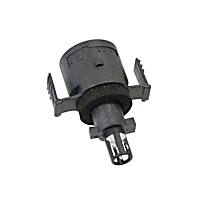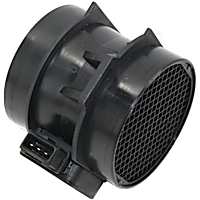An on-board diagnostic or OBD-II code helps you troubleshoot possible issues in your car. But before you can take steps to resolve the underlying problem, you must first identify what the logged code means. Read on to learn all about trouble code P0110—its definition, possible triggers, and common symptoms.
What Does the P0110 Code Mean?
Diagnostic trouble code (DTC) P0110 stands for “Intake Air Temperature Sensor Circuit (Bank 1).” This error code is set when the powertrain control module (PCM) perceives that the signal from the intake air temperature (IAT) sensor circuit does not match factory specifications.
The “sensor 1” portion of the code applies to vehicles that have multiple IAT sensors. Bank 1 points to the side of the engine opposite the #1 cylinder.

The IAT sensor is a negative temperature coefficient (NTC) thermistor that decreases in resistance as the temperature of the sensor increases. Its purpose is to measure the temperature of the air entering the engine and provide this data to the PCM.
The information provided by the IAT sensor (along with various other sensors) is used by the PCM for fuel control and ignition timing. If the PCM detects that the signal it has received from the IAT sensor might be out of normal operating range, it will log trouble code P0110.
If you want to learn more about the IAT sensor, you can read our technical discussion about how it can cause OBD codes like P0110 to get logged. Remember that codes like P0110 shouldn’t be ignored.
P0110 on Some Toyota Vehicles
The IAT sensor is built into the air flow meter and senses the intake air temperature. A thermistor built in the sensor changes the resistance value according to the intake air temperature. If the ECM detects the DTC “P0110”, it operates the fail−safe function in which the intake air temperature is assumed to be 20°C (68°F).
Code P0110 may appear on some Toyota vehicles. On a 1998 Toyota Camry LE 3.0L V6, for example, this DTC can be caused by the following:
- Open or short in intake air temperature sensor circuit
- Issue with IAT sensor (built into mass air flow meter)
- Problem with ECM
After confirming DTC P0110 use the OBD II scan tool or TOYOTA hand−held tester to confirm the intake air temp. from “CURRENT DATA”. Refer to the table below for more information.
| Temp. Displayed | Malfunction |
| −40°C ( −40°F ) | Open circuit |
| 140°C ( 284°F ) or more | Short circuit |
Note: The definition of code P0110 may be different depending on the vehicle manufacturer. Consult the appropriate repair manual or repair database for the exact code definition.
What are the Possible Causes of the P0110 Code?
Here are some common triggers of the error code P0110:
- Defective IAT sensor
- Bad mass air flow sensor (sometimes the IAT is integrated into the MAF)
- Circuit issues
- Faulty PCM

What are the Common Symptoms of the P0110 Code?
You may notice the following symptoms if you drive a car that has a logged trouble code P0110:
- Illuminated check engine light
- Poor engine performance
- Poor gas mileage
How to Diagnose the P0110 Code
To avoid complications, code P0110 should be resolved immediately. However, it may be difficult to pinpoint the exact cause of the problem. There are many possible triggers associated with this code.
Keep in mind that the diagnostic and repair steps for this code will vary depending on the specifications of your vehicle. As all cars are built differently, they may require varying diagnostic processes.
For instance, a P0110 code on a Toyota may be diagnosed differently from a code P0110 on a Nissan. This is why it’s important to refer to a repair manual before troubleshooting your vehicle. But if reading it has only left you confused, it might be best to leave the job to an expert.

How to Fix the P0110 Code
The P0110 code may share similar triggers and symptoms with other DTCs. However, this does not mean it shares the same fixes. All vehicles are different, so you should always refer to your vehicle’s factory repair information before DIY-ing any repairs.
Look for confirmed solutions specific to your vehicle and consult a repair manual or repair database before attempting any fixes. If you aren’t confident in your automotive repair skills, it may be best to enlist the help of a professional.
Get a Replacement Intake Air Temperature Sensor that Fits Your Car
A defective IAT sensor is likely what’s triggering DTC P0110 in your vehicle. Since the IAT sensor is built into the mass airflow sensor in some models, replacing the MAF sensor might be the way to go. Your vehicle’s likely suffering from bad engine performance and low gas mileage as a result. It’s best to replace the defective parts as soon as possible to get rid of these annoyances. Thankfully, CarParts.com has your back.
CarParts.com offers parts that are guaranteed to fit your vehicle no matter its make and model. Use our built-in vehicle selector to ensure the parts you see will fit your vehicle perfectly. Our easy-to-navigate website makes browsing the many available intake air temperature sensors and mass airflow sensors easy. Once you pick the right one, you can proceed through our convenient and secure checkout. We’ll deliver your new part right to your door in as fast as two business days.
Avoid the headaches of poor engine performance. Replace your intake air temperature sensor as soon as possible by ordering at CarParts.com.
Products Mentioned in this Guide
Any information provided on this Website is for informational purposes only and is not intended to replace consultation with a professional mechanic. The accuracy and timeliness of the information may change from the time of publication.


 Air Temperature Sensor
Air Temperature Sensor
 Mass Air Flow Sensor
Mass Air Flow Sensor

















MY 2010 TOWN AN COUNTRY WILL START UP RUN FIND GOS INTO GEAR WONT GO OVER 1 MILE PER HOURHAVE METER PUT PEADAL ON NEW NHOTING CHANGED MEAN NHOTHING SO TOOK IT BACK CAN SOMEONE HELP OH RIGHT WHEN IT ACURED HAD TO GET A BOOST STARTED UP STARTED TO PULL OUT WIFE SAID ITS NOT TAKEING GAS.
Hello,
Just to clarify, the car won’t accelerate and won’t take fuel at the pump, is that correct? Are there any diagnostic trouble codes stored?